
Stratford-upon-Avon: The Birthplace of Shakespeare
Stratford-upon-Avon, a charming market town in the heart of England, is world-famous as the birthplace of William Shakespeare. Nestled along the banks of the River Avon, this historic town offers a rich tapestry of cultural heritage and scenic beauty. As you stroll through its quaint streets, you will be transported back in time, surrounded by Tudor-style architecture and a palpable sense of history. Attractions like Shakespeare’s Birthplace, Anne Hathaway’s Cottage, and the Royal Shakespeare Theatre draw visitors from all over the globe. Each site offers a unique glimpse into the life and times of the Bard, making it a haven for literature enthusiasts. The town is also home to a variety of museums, including the MAD Museum, which showcases mechanical art and design. Beyond its literary fame, Stratford-upon-Avon boasts beautiful parks and gardens such as Bancroft Gardens and the Butterfly Farm. These natural retreats offer a peaceful respite from the bustling town center. The town also hosts a range of events throughout the year, from traditional markets to the Stratford-upon-Avon Literary Festival, ensuring there is always something exciting to experience. Culinary delights await you in Stratford-upon-Avon, with a plethora of dining options ranging from cozy tearooms to fine dining restaurants. Local pubs offer hearty meals and a chance to mingle with friendly locals. Shopping enthusiasts will enjoy browsing unique boutiques and antique shops, perfect for finding a special keepsake from your visit.
Local tips in Stratford-upon-Avon
- Book theatre tickets in advance, especially during peak seasons, to secure seats for popular performances at the Royal Shakespeare Theatre.
- Consider visiting during the Stratford-upon-Avon Literary Festival for a range of literary events and activities.
- Wear comfortable shoes for walking as many attractions are within a short distance of each other, and the town is best explored on foot.
- Check out the local markets for unique souvenirs and local crafts, especially the weekly farmers' market.
- Take a boat trip on the River Avon for a different perspective of the town and to enjoy its scenic beauty.
Stratford-upon-Avon: The Birthplace of Shakespeare
Stratford-upon-Avon, a charming market town in the heart of England, is world-famous as the birthplace of William Shakespeare. Nestled along the banks of the River Avon, this historic town offers a rich tapestry of cultural heritage and scenic beauty. As you stroll through its quaint streets, you will be transported back in time, surrounded by Tudor-style architecture and a palpable sense of history. Attractions like Shakespeare’s Birthplace, Anne Hathaway’s Cottage, and the Royal Shakespeare Theatre draw visitors from all over the globe. Each site offers a unique glimpse into the life and times of the Bard, making it a haven for literature enthusiasts. The town is also home to a variety of museums, including the MAD Museum, which showcases mechanical art and design. Beyond its literary fame, Stratford-upon-Avon boasts beautiful parks and gardens such as Bancroft Gardens and the Butterfly Farm. These natural retreats offer a peaceful respite from the bustling town center. The town also hosts a range of events throughout the year, from traditional markets to the Stratford-upon-Avon Literary Festival, ensuring there is always something exciting to experience. Culinary delights await you in Stratford-upon-Avon, with a plethora of dining options ranging from cozy tearooms to fine dining restaurants. Local pubs offer hearty meals and a chance to mingle with friendly locals. Shopping enthusiasts will enjoy browsing unique boutiques and antique shops, perfect for finding a special keepsake from your visit.
When is the best time to go to Stratford-upon-Avon?
Iconic landmarks you can’t miss
Broadway Tower
An 18th-century Gothic folly atop the Cotswolds offering rich history, panoramic views, and a cultural retreat for artists and visitors alike.
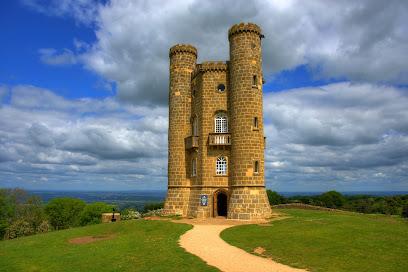
Garrick
Step into Stratford-upon-Avon's oldest pub, where medieval charm meets hearty fare and centuries of captivating history.
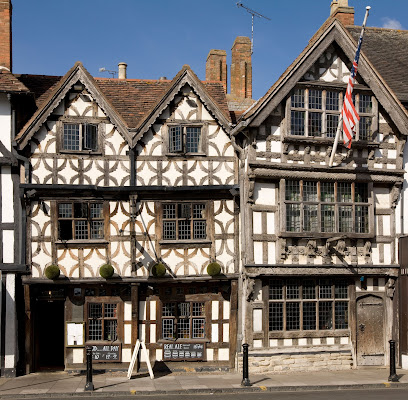
Church of St Peter and St Paul, Northleach
The 'Cathedral of the Cotswolds'—a 15th-century masterpiece built by wool merchants at the height of medieval prosperity.
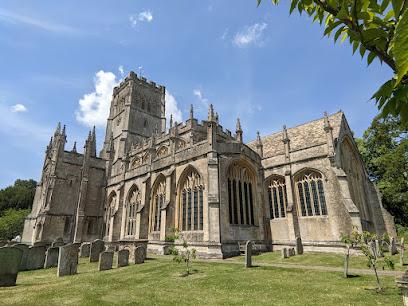
The Guild Chapel
Medieval masterpiece with rare wall paintings hidden for centuries—a window into pre-Reformation England.
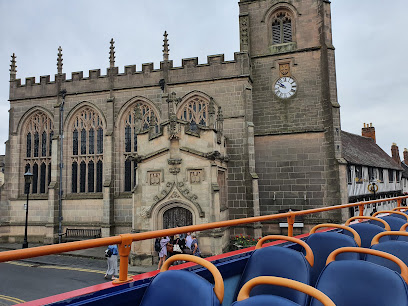
Stratford Waterside Market
Discover unique artisan treasures and vibrant street food in Stratford-upon-Avon's charming riverside market.
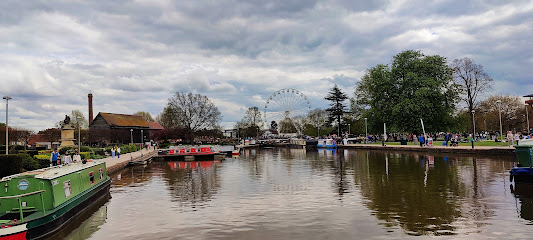
The Shakespeare Memorial Fountain
A Victorian Gothic tribute to Shakespeare and Anglo-American friendship, blending literary heritage with historic charm in Stratford's vibrant marketplace.
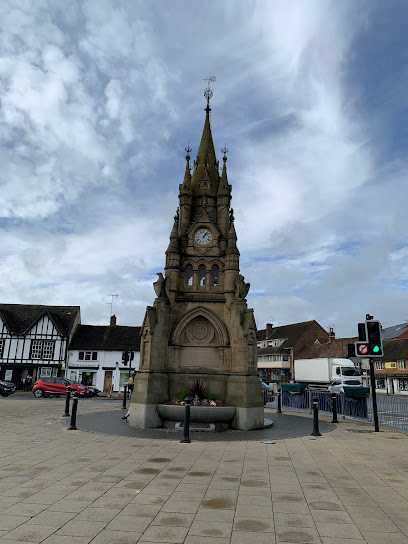
RAF Bicester
Explore RAF Bicester, the UK’s most complete interwar bomber airfield, where history and heritage soar across preserved grass runways and iconic hangars.

Chamberlain Clock
An elegant Edwardian clock tower at the heart of Birmingham’s Jewellery Quarter, built in 1903 as a memorial to Joseph Chamberlain and recently restored to its former glory.
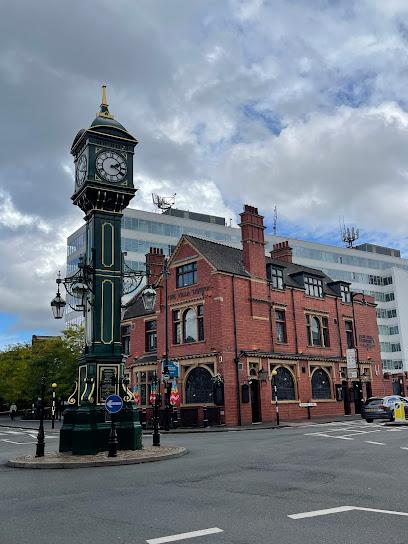
Statue Of Shakespeare Stratford-upon-Avon
A bronze tribute to the Bard in the heart of Stratford-upon-Avon, where literature and history come alive on Henley Street.
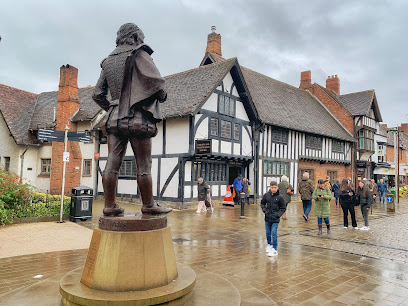
Stratford-upon-Avon Town Hall
Historic Stratford-upon-Avon Town Hall: A timeless civic landmark and vibrant cultural venue in the heart of the market town.
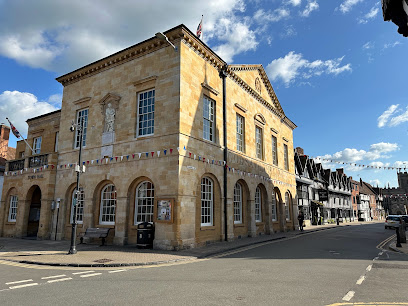
Hailes Church
Explore the medieval Hailes Church and evocative ruins of Hailes Abbey, a royal-founded pilgrimage site famed for the Holy Blood relic.
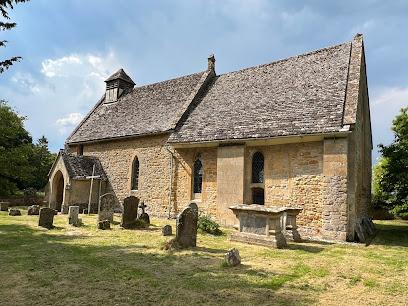
Sir Frank Whittle
Coventry's tribute to the jet engine pioneer who revolutionized aviation and transformed modern flight.
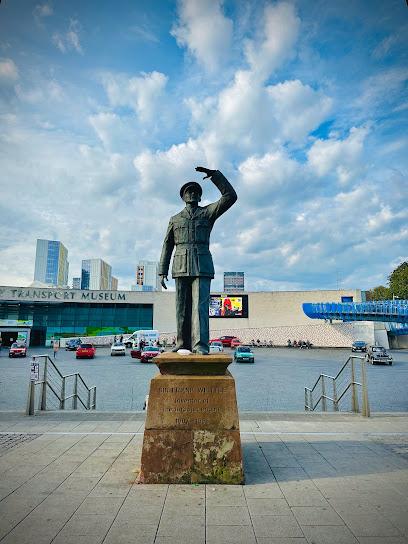
Fords Hospital Alms House
Step back into Tudor England at Ford's Hospital, a beautifully preserved 16th-century almshouse in Coventry with rich history and timeless charm.
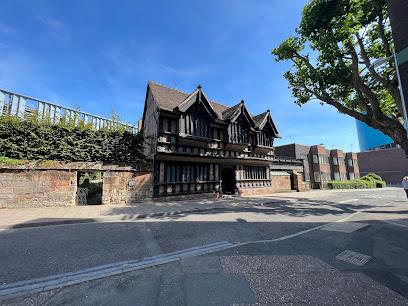
Tramway Bridge
Historic 1826 red brick pedestrian bridge over the River Avon, blending industrial heritage with tranquil riverside views in Stratford-upon-Avon.
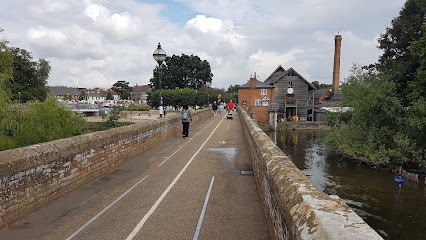
The Randolph Turpin Statue
Celebrate the legacy of British boxing champion Randolph Turpin with this striking bronze statue in Warwick’s historic Market Square.
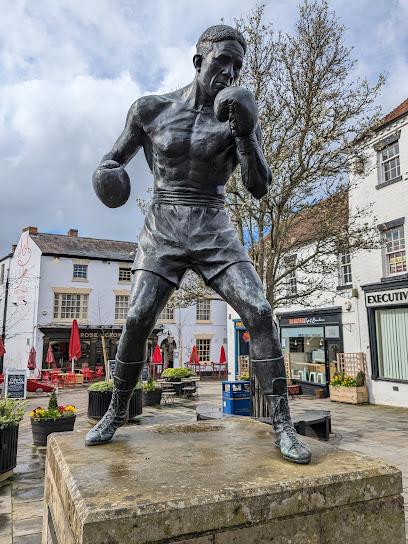
Unmissable attractions to see
Bullring & Grand Central
Birmingham’s iconic shopping and dining destination blending modern style with vibrant city energy in the heart of the city center.
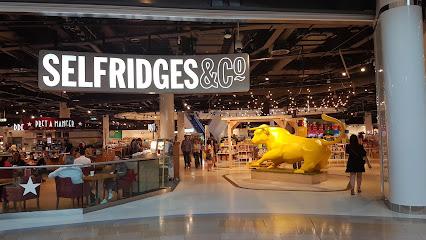
Warwick Castle
Step into over a millennium of history at Warwick Castle, where medieval grandeur meets thrilling live shows and enchanting gardens.
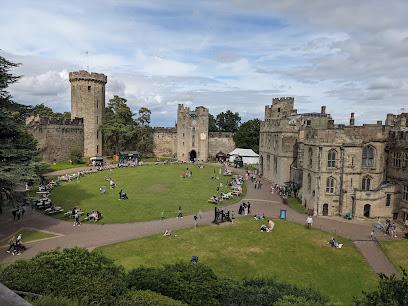
Cadbury World
Discover the magic of chocolate at Cadbury World, Birmingham’s immersive family attraction celebrating over a century of Cadbury heritage.
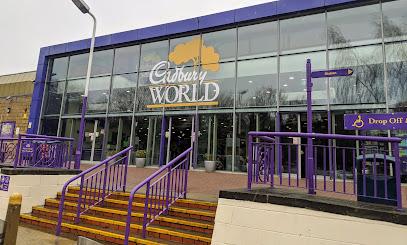
Blenheim Palace
Explore Blenheim Palace’s grand Baroque architecture, vast Capability Brown parkland, and immersive historic experiences in Oxfordshire’s UNESCO World Heritage gem.
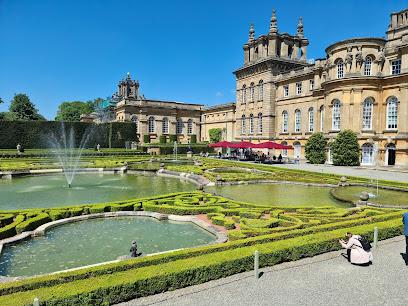
Shakespeare's Birthplace
Step inside the Tudor home where Shakespeare was born and begin your journey into the life of the world’s greatest playwright.
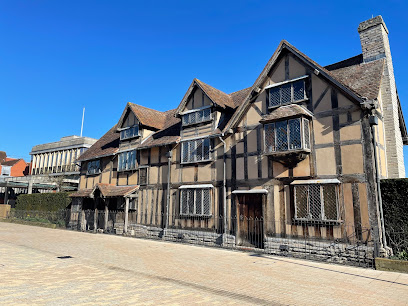
National SEA LIFE Centre Birmingham
Discover the UK's only 360° Ocean Tunnel and meet over 2,000 marine creatures including the nation's first rescued sea otters in Birmingham’s vibrant aquarium.

Cannon Hill Park
A vibrant 200-acre urban park in Birmingham offering gardens, lakes, sports, arts, and family-friendly fun year-round.
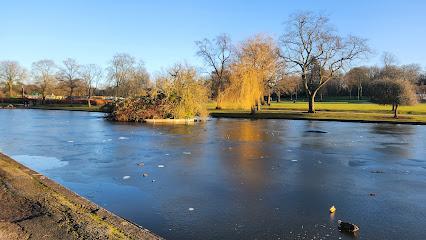
Birmingham Hippodrome
Experience world-class ballet, musicals, and theatre at Birmingham Hippodrome, the beating heart of performing arts in Birmingham’s South Side.
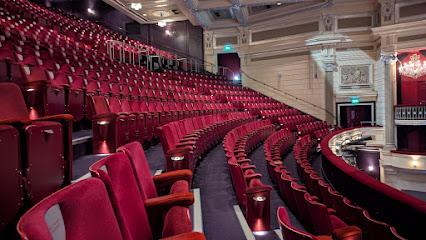
British Motor Museum
Explore the world’s largest collection of historic British cars and discover the rich heritage of Britain’s motor industry in the heart of Warwickshire.
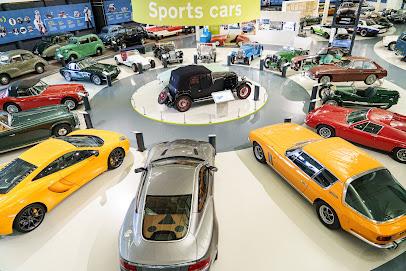
Stratford Butterfly Farm
Explore the UK's largest tropical butterfly paradise nestled in Stratford-upon-Avon's heart, where rainforest magic and exotic insects await.
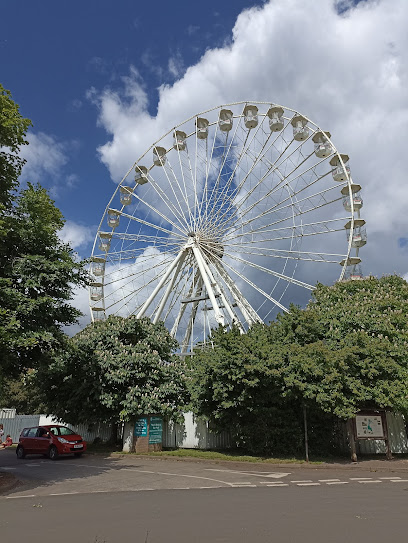
Birmingham Museum & Art Gallery
Explore Birmingham’s historic museum showcasing world-class art, the Staffordshire Hoard, and vibrant cultural exhibitions in a stunning Victorian landmark.
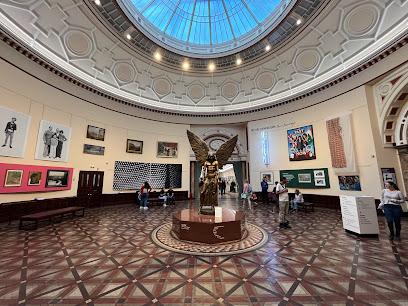
Symphony Hall
Experience world-class acoustics and diverse live music in Birmingham’s iconic Symphony Hall, a cultural jewel on Broad Street.
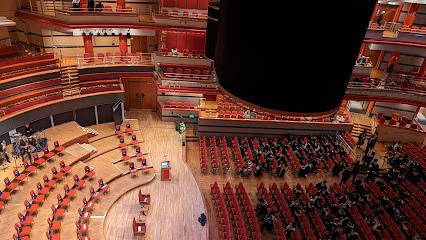
Mailbox Birmingham
Birmingham’s premier canalside destination for luxury shopping, dining, media, and vibrant urban living.
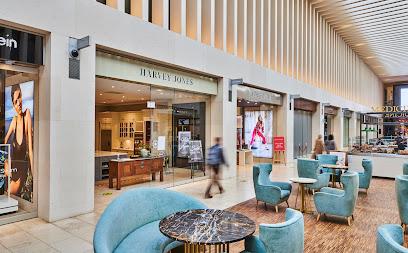
Coventry Transport Museum
Discover Britain’s transport heritage and marvel at record-breaking vehicles in Coventry’s largest and most interactive transport museum.
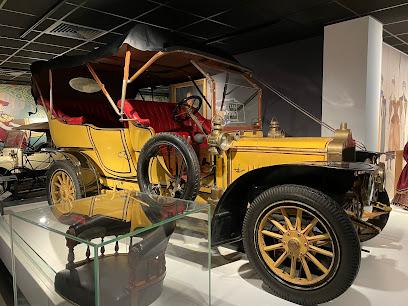
Selfridges Birmingham
Experience luxury shopping in Birmingham’s iconic Selfridges, famed for its futuristic design and premium retail offerings.
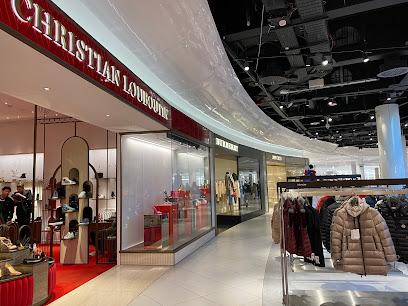
Essential places to dine
Miller & Carter Stratford Avon
Contemporary steakhouse excellence in Stratford-upon-Avon, serving prime British and Irish steaks in a stylish, welcoming setting.
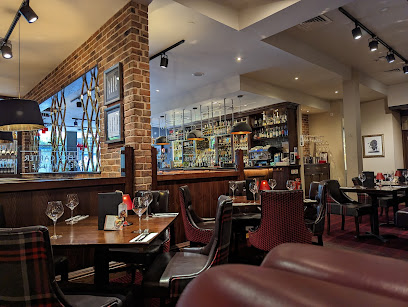
Dirty Duck
Historic riverside pub in Stratford-upon-Avon offering quality British fare, vegan options, and a lively atmosphere loved by locals and theatre actors alike.
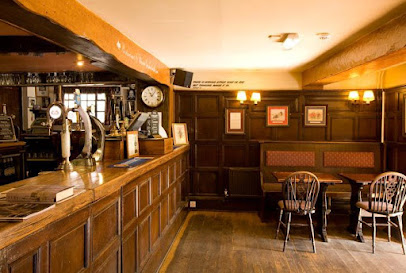
Encore Stratford Upon Avon
A stylish British pub and restaurant in Stratford-upon-Avon offering classic dishes, waterfront views, and a lively yet welcoming atmosphere.
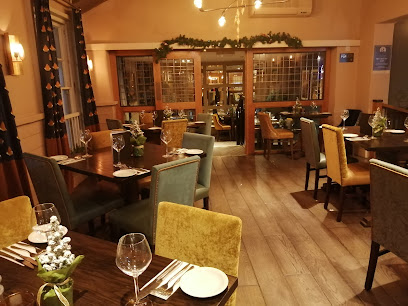
El Greco
Discover authentic Greek cuisine and vibrant Mediterranean flavors in the historic heart of Stratford-upon-Avon at El Greco.
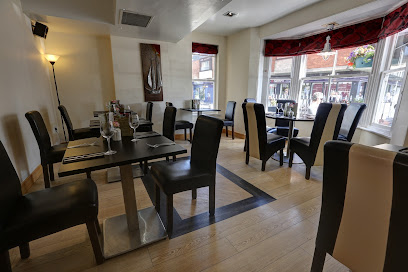
The Old Thatch Tavern
Step into Stratford’s oldest pub for hearty British classics, real ales, and centuries of historic charm in a cozy, lively setting.
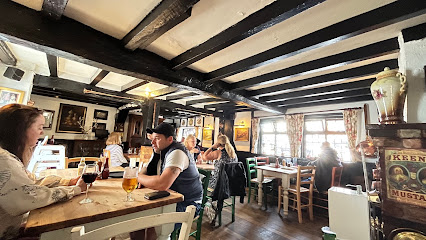
Loxleys Restaurant & Wine Bar
A family-run modern British restaurant in Stratford-upon-Avon, famed for innovative cuisine, cozy ambiance, and an exceptional wine selection.
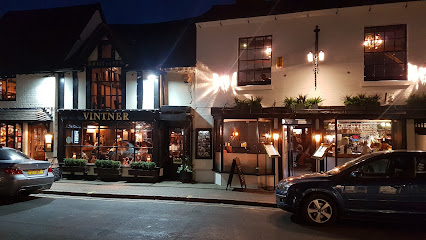
Zizzi - Stratford-upon-Avon
Italian flavours in the heart of Shakespeare’s Stratford, with wood-fired pizzas, fresh pasta, and a rooftop terrace for al fresco dining.
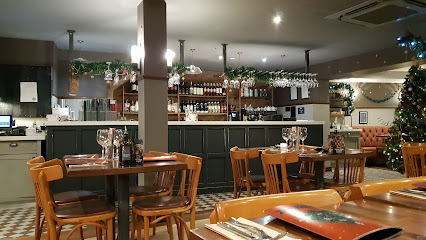
Lambs
Historic Tudor charm and classic English cuisine combine at Lambs, Stratford-upon-Avon's beloved cozy restaurant.
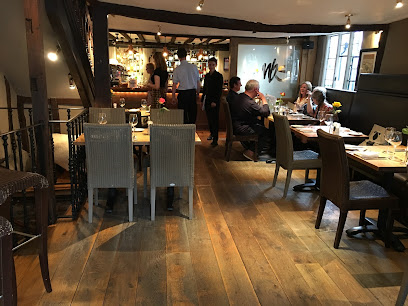
Giggling Squid - Stratford upon Avon
Vibrant Thai tapas and bold flavours in the heart of Stratford-upon-Avon, perfect for sharing with friends and family after a day exploring Shakespeare’s town.
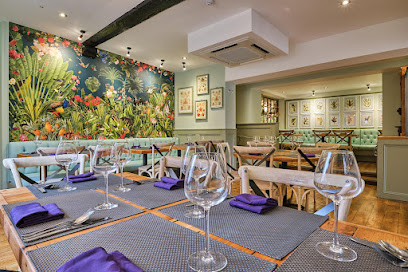
Café Rouge - Stratford Upon Avon
Classic French bistro charm with authentic cuisine and a welcoming atmosphere in Stratford-upon-Avon’s historic center.
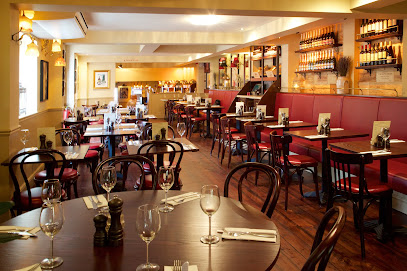
The Baraset Barn
Charming countryside restaurant and boutique hotel near Stratford-upon-Avon, blending rustic heritage with vibrant global cuisine and modern comfort.
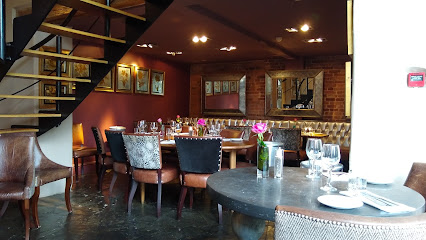
Bella Italia - Stratford Upon Avon
Enjoy authentic Italian classics with gluten-free and vegan options in the heart of historic Stratford Upon Avon.
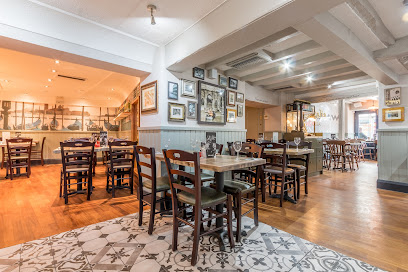
Wildwood Restaurants Stratford-upon-Avon
Contemporary Italian dining in Stratford-upon-Avon with standout vegan options and a bright, welcoming atmosphere.
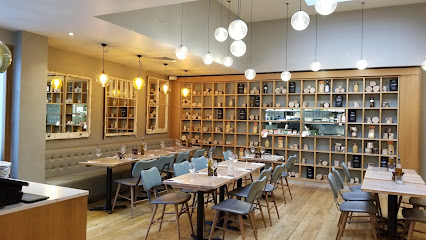
The Vintner
A historic Stratford wine bar and restaurant serving seasonal British fare in a warm, traditional setting, ideal for pre-theatre dining.
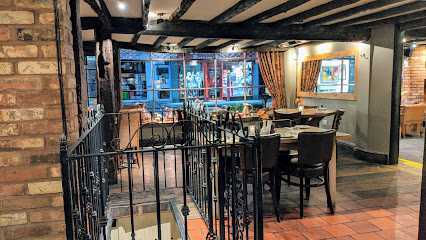
Bistrot Pierre - Stratford-upon-Avon
Relaxed French dining with scenic river views in Stratford-upon-Avon’s historic Swan’s Nest Hotel.
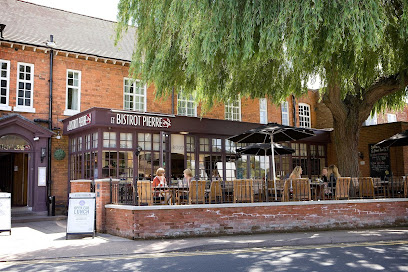
Markets, malls and hidden boutiques
Maybird Shopping Park
A convenient and sustainable shopping destination near Stratford-upon-Avon’s historic heart, offering diverse stores and ample free parking.
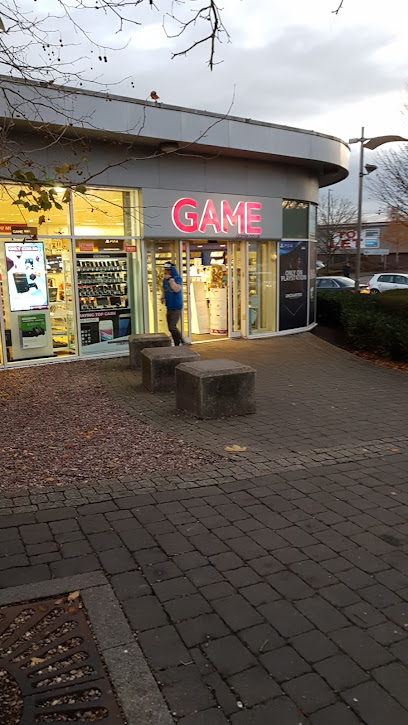
Marks and Spencer
A trusted British retail destination offering quality food, clothing, and convenience in the heart of Stratford-upon-Avon.
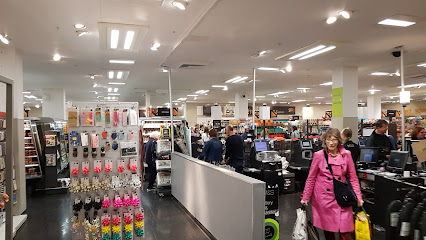
Lush Cosmetics Stratford Upon Avon
Discover fresh, handmade, and ethical beauty products at Lush Stratford Upon Avon, where sustainability meets vibrant community spirit.
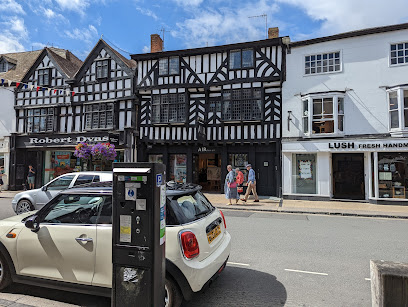
Wilfreds of Stratford
Discover timeless sweets and local charm at Wilfreds of Stratford, a beloved confectionery shop on Stratford-upon-Avon's historic High Street.
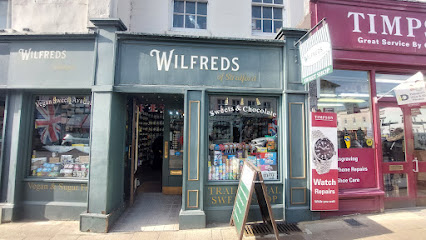
The Shakespeare Birthplace Shop
Discover Shakespeare’s world through a rich collection of gifts and books in this charming shop beside his birthplace on Henley Street.
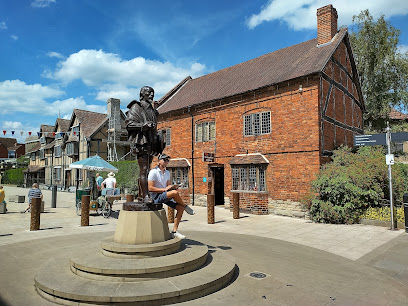
Vinegar Hill
Discover unique gifts and stylish homewares in a cozy boutique setting at Vinegar Hill, Stratford-upon-Avon's charming treasure trove.
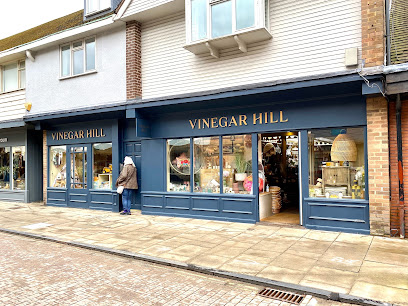
Cotswold Bullion
Family-run gold bullion specialists in Stratford-upon-Avon offering trusted investment products with expert guidance and personalized service.
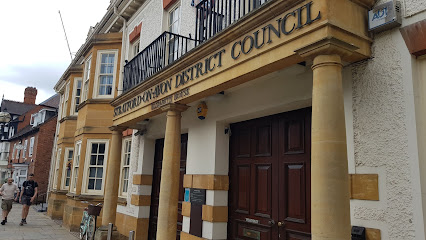
Anne Hathaway's Cottage Gift Shop
Discover Shakespearean treasures and charming garden gifts beside Anne Hathaway’s historic cottage in Stratford-upon-Avon.
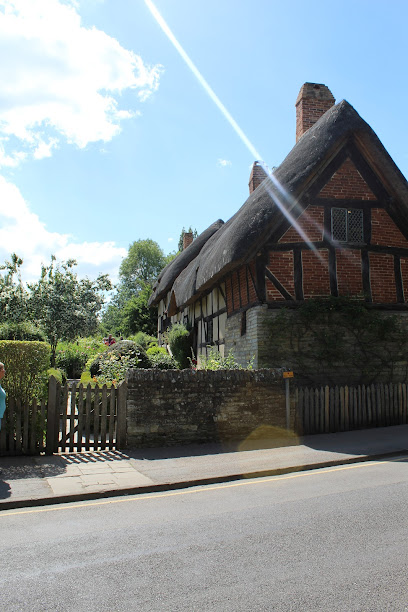
For Something Different
Discover authentic artisan gifts and handcrafted treasures from local artists in Stratford's most distinctive independent shop.
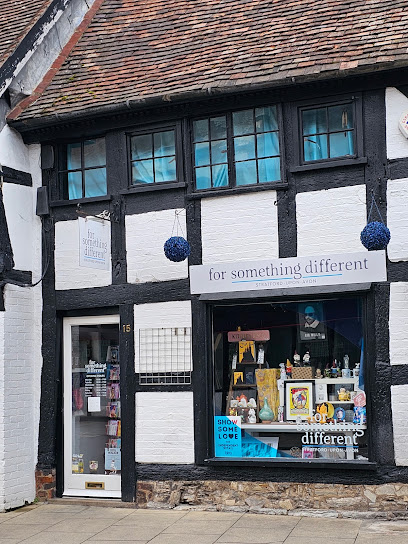
Daisy Chain Gift Company Ltd
Award-winning boutique in Stratford-upon-Avon offering unique contemporary gifts, design-led cards, stylish stationery, and premium gift wrap.
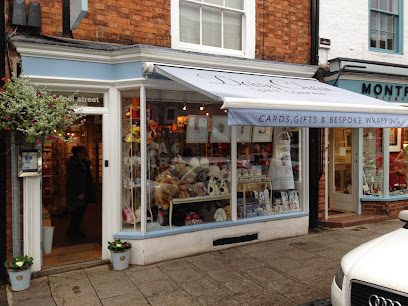
Razzle Dazzle
Discover timeless vintage fashion and unique costume treasures in the cozy charm of Razzle Dazzle, Stratford-upon-Avon’s beloved boutique.
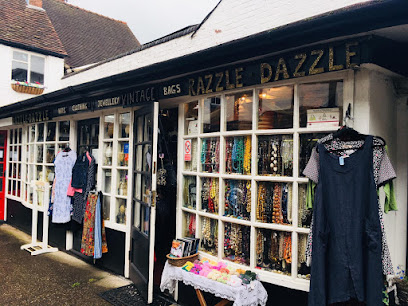
Timeless Tales
Discover charming collectibles, books, and toys in the heart of Shakespeare’s Stratford at Timeless Tales gift shop.
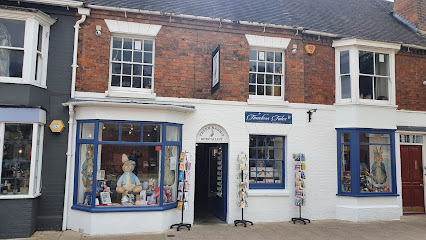
White Stuff Stratford Upon Avon
Contemporary, sustainable fashion for all ages in the heart of historic Stratford-upon-Avon.
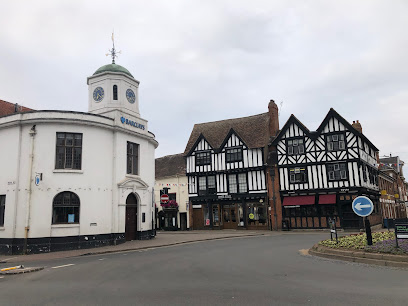
Jack Wills
Discover timeless British fashion and contemporary style at Jack Wills in the heart of Stratford-upon-Avon’s historic High Street.
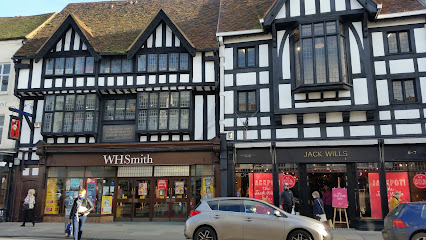
Dorothy & Theodore
Discover unique gifts and local charm at Dorothy & Theodore, a beloved boutique in the heart of Stratford-upon-Avon.

Essential bars & hidden hideouts
Dirty Duck
Historic riverside pub in Stratford-upon-Avon, beloved by actors and visitors for its quality British fare and charming garden setting.
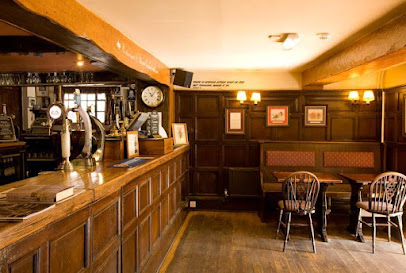
Encore Stratford Upon Avon
Classic British pub and restaurant in Stratford-upon-Avon offering riverside views, diverse menus, and a warm, stylish atmosphere.
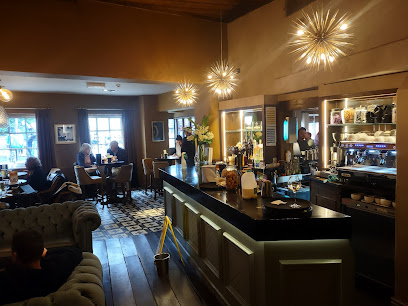
Garrick
Step into Stratford’s oldest pub, The Garrick Inn, where medieval charm meets hearty British fare in a cozy timber-framed setting.
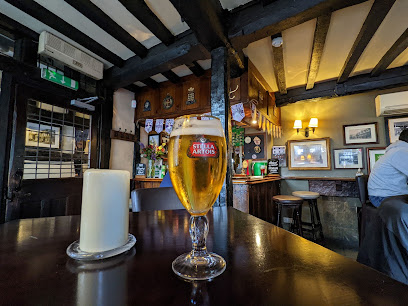
Cox's Yard, Stratford-Upon-Avon
Lively riverside pub in Stratford-upon-Avon blending casual dining, sports, and scenic views by the River Avon.
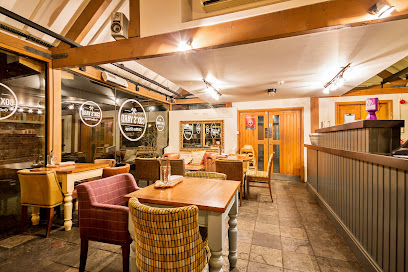
Rose & Crown
Classic English pub charm with hearty fare, friendly service, and a spacious garden in the heart of Stratford-upon-Avon.
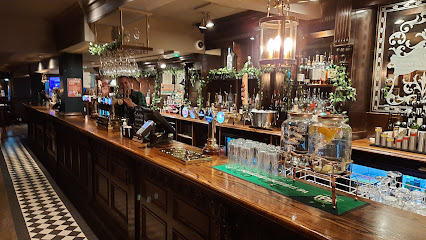
The Old Thatch Tavern
Step into Stratford's oldest pub for hearty traditional fare, historic Tudor charm, and a warm, welcoming atmosphere.
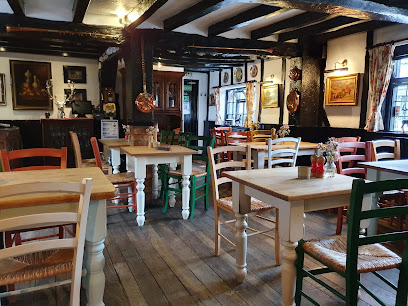
Loxleys Restaurant & Wine Bar
Discover Loxleys Restaurant & Wine Bar for an exquisite blend of British & modern European cuisine in the heart of Stratford-upon-Avon.

Windmill
A welcoming traditional British pub in Warwickshire serving classic dishes and local brews in a cozy, community-focused setting.
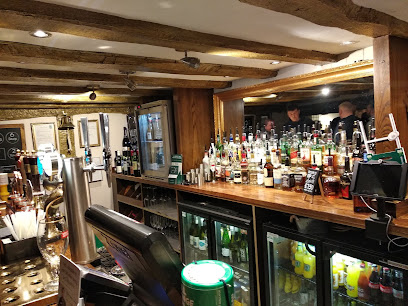
The One Elm
A vibrant gastropub near Shakespeare’s birthplace offering fresh British cuisine, friendly service, and a charming courtyard in Stratford-upon-Avon.
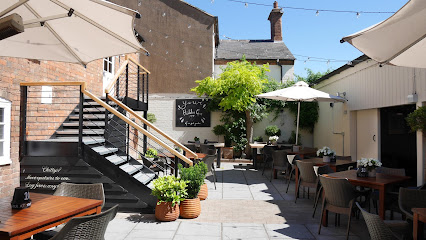
The Vintner
A cozy historic wine bar and restaurant in Stratford-upon-Avon offering modern British cuisine and a welcoming atmosphere.
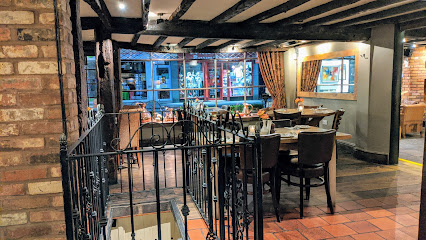
All Bar One Stratford Upon Avon
Stylish wine bar in Stratford offering diverse dining, full bar, and a relaxed, accessible atmosphere near Shakespeare’s birthplace.
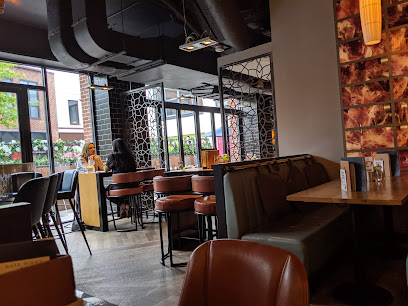
The Stratford Alehouse
A cozy micropub in Stratford-upon-Avon celebrated for exceptional real ales, live music, and a warm, welcoming atmosphere.
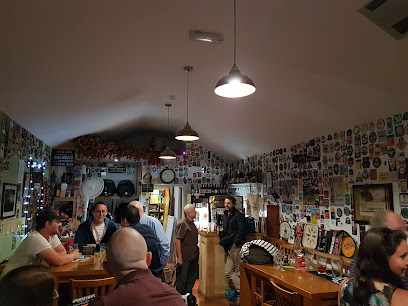
The Bear
Historic riverside pub in Stratford-upon-Avon serving classic ales and comforting British fare in a warm, cosy setting with scenic river views.
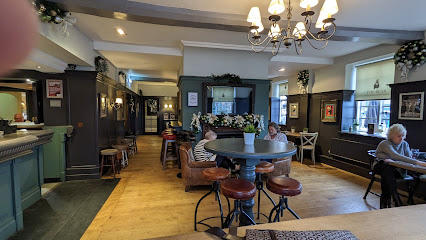
The Coach House
A cozy microbrewery pub in Stratford-upon-Avon serving hearty food, craft beers, and welcoming all with a lively, dog-friendly atmosphere.
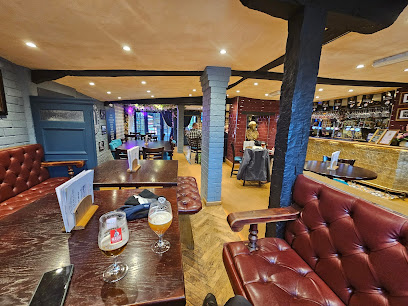
Local Phrases
-
- HelloAlreet
[al-reet] - GoodbyeTa-ra
[tah-rah] - YesAye
[aye] - NoNah
[nah] - Please/You're welcomePlease/You're welcome
[please/yer welcome] - Thank youCheers
[cheers] - Excuse me/SorryPardon
[pah-dun] - How are you?How's it goin'?
[hows it goin] - Fine. And you?Alright. And you?
[al-reet. and you] - Do you speak English?D'ya speak English?
[dee-ya speak english] - I don't understandI don't get ya
[I dont get ya]
- HelloAlreet
-
- I'd like to see the menu, pleaseI'll 'ave a gander at the menu, please
[ill 'ave a gander at the menu, please] - I don't eat meatI dun't eat meat
[I dun't eat meat] - Cheers!Cheers!
[cheers] - I would like to pay, pleaseI'll settle up, please
[ill settle up please]
- I'd like to see the menu, pleaseI'll 'ave a gander at the menu, please
-
- Help!Help!
[help] - Go away!Clear off!
[clear off] - Call the Police!Ring the bobbies!
[ring the bobbies] - Call a doctor!Get a doctor round 'ere!
[get a doctor round 'ere] - I'm lostI'm all turned around
[im all turned around] - I'm illI'm poorly
[im poorly]
- Help!Help!
-
- I'd like to buy...I'll 'ave that...
[ill 'ave that] - I'm just lookingI'm just browsing
[im just browsing] - How much is it?How much is that?
[how much is that] - That's too expensiveThat's a bit pricey
[thats a bit pricey] - Can you lower the price?Can you do it cheaper?
[can you do it cheaper]
- I'd like to buy...I'll 'ave that...
-
- What time is it?What's the time?
[whats the time] - It's one o'clockIt's one
[its one] - Half past (10)Half ten
[half ten] - MorningMorning
[morning] - AfternoonAfternoon
[afternoon] - EveningEvening
[evening] - YesterdayYesterday
[yesterday] - TodayToday
[today] - TomorrowTomorrow
[tomorrow] - 1One
[one] - 2Two
[two] - 3Three
[three] - 4Four
[four] - 5Five
[five] - 6Six
[six] - 7Seven
[seven] - 8Eight
[eight] - 9Nine
[nine] - 10Ten
[ten]
- What time is it?What's the time?
-
- Where's a/the...?Where's a/the...?
[wheres a/the] - What's the address?What's the address?
[whats the address] - Can you show me (on the map)?Can you show me (on the map)?
[can you show me (on the map)] - When's the next (bus)?When's the next (bus)?
[whens the next (bus)] - A ticket (to ....)A ticket (to ....)
[a ticket (to)]
- Where's a/the...?Where's a/the...?
History of Stratford-upon-Avon
-
Stratford-upon-Avon has a history that stretches back to Roman times. Archaeological evidence suggests that the area was used as a Roman settlement, with remnants of Roman roads and artifacts discovered in the vicinity.
-
The town of Stratford-upon-Avon was officially founded in 1196 when King Richard I granted the town a charter. The name 'Stratford' derives from the Old English 'Straet' (street) and 'Ford' (river crossing), hinting at its origins as a crossing point over the River Avon.
-
Stratford-upon-Avon is most famous as the birthplace of William Shakespeare, born in 1564. Shakespeare's birthplace, located on Henley Street, is now a museum dedicated to the playwright's life and works.
-
The Guild Chapel in Stratford-upon-Avon was founded in 1269 by the Guild of the Holy Cross. It has served various purposes over the centuries, including as a place of worship and a school.
-
In 1597, William Shakespeare purchased New Place, one of the largest houses in Stratford-upon-Avon. The house served as his family home until his death in 1616. Though the original house was demolished, the site remains an important historical landmark.
-
The American Fountain was erected in 1887 to commemorate Queen Victoria's Golden Jubilee. It was a gift from George W. Childs, a philanthropist from Philadelphia, symbolizing the friendship between the United States and the United Kingdom.
-
Holy Trinity Church is one of the most visited churches in England, as it is the burial site of William Shakespeare. The church itself dates back to 1210 and features stunning Gothic architecture.
-
The Royal Shakespeare Theatre, opened in 1932, is dedicated to the works of William Shakespeare. It has become a cultural hub, attracting visitors from all over the world to witness performances by the Royal Shakespeare Company.
-
During the Industrial Revolution, Stratford-upon-Avon experienced significant growth and modernization. The arrival of the railway in 1859 connected the town to major cities, further boosting its economic and cultural development.
-
Stratford-upon-Avon played a role in World War II, serving as a refuge for evacuees from London. The town also experienced some bombings, but its historical buildings and landmarks largely survived the war.
Stratford-upon-Avon Essentials
-
Stratford-upon-Avon is easily accessible from various parts of the United Kingdom. The nearest major airport is Birmingham Airport, approximately 27 miles away. From Birmingham, you can take a direct train to Stratford-upon-Avon, which takes about 1 hour. Alternatively, you can drive or take a taxi. For those coming from London, direct trains from London Marylebone station take around 2 hours. National Express and other coach services also operate routes to Stratford-upon-Avon from various UK cities.
-
Once in Stratford-upon-Avon, getting around is quite convenient. The town is compact and many attractions are within walking distance. Local buses operated by Stagecoach and Diamond Bus connect various parts of the town and nearby villages. Taxis are readily available and can be hailed on the street or booked through local taxi companies. For a leisurely experience, consider renting a bicycle to explore the town and its scenic surroundings.
-
The official currency in the United Kingdom is the British Pound Sterling (GBP). Credit and debit cards are widely accepted in hotels, restaurants, and shops, but it is advisable to carry some cash for smaller establishments and market purchases. ATMs are available throughout Stratford-upon-Avon, and most major banks have branches in the town.
-
Stratford-upon-Avon is generally a safe destination for tourists. However, as with any tourist destination, it is important to remain vigilant. Avoid leaving your belongings unattended and be cautious in crowded areas, especially during peak tourist seasons. There are no specific high-crime areas targeting tourists, but standard safety precautions should be observed.
-
In case of emergency, dial 999 for immediate assistance from the police, fire, or ambulance services. The local police station is located at Rother Street, and the nearest hospital with an emergency department is Warwick Hospital, approximately 9 miles away. It is recommended to have travel insurance that covers medical emergencies. Pharmacies are available in the town for minor health issues.
-
Fashion: Do dress comfortably and in layers, as the weather can be unpredictable. Avoid overly casual clothing when dining in upscale restaurants. Religion: Do respect local customs when visiting religious sites, such as covering your head in churches. Public Transport: Do be polite and give up your seat to elderly or disabled passengers. Don't eat or drink on public transport. Greetings: Do greet people with a friendly 'hello' or 'hi'. A handshake is common in formal settings. Eating & Drinking: Do try local delicacies and accept food offerings graciously. Don't leave a tip if the service charge is included in the bill; otherwise, a 10-15% tip is customary.
-
To experience Stratford-upon-Avon like a local, consider visiting outside of peak tourist seasons for a more relaxed atmosphere. Engage with locals in pubs and cafes, where you can enjoy traditional British fare and beverages. Take a leisurely stroll along the River Avon or rent a rowboat for a unique perspective of the town. Don't miss the local markets, where you can find fresh produce, artisanal goods, and unique souvenirs. For a touch of history, visit the Shakespeare Birthplace Trust properties, including Shakespeare's Birthplace and Anne Hathaway's Cottage.
Trending Landmark in Stratford-upon-Avon
-
Broadway Tower
-
Garrick
-
Church of St Peter and St Paul, Northleach
-
The Guild Chapel
-
Stratford Waterside Market
-
The Shakespeare Memorial Fountain
-
RAF Bicester
-
Chamberlain Clock
-
Statue Of Shakespeare Stratford-upon-Avon
-
Stratford-upon-Avon Town Hall
-
Hailes Church
-
Sir Frank Whittle
-
Fords Hospital Alms House
-
Tramway Bridge
-
The Randolph Turpin Statue
Nearby Cities to Stratford-upon-Avon
-
Things To Do in Birmingham
-
Things To Do in Oxford
-
Things To Do in Nottingham
-
Things To Do in Bath
-
Things To Do in Bristol
-
Things To Do in Windsor
-
Things To Do in Cambridge
-
Things To Do in Cardiff
-
Things To Do in London
-
Things To Do in Sheffield
-
Things To Do in Chester
-
Things To Do in Manchester
-
Things To Do in Liverpool
-
Things To Do in Leeds
-
Things To Do in York













